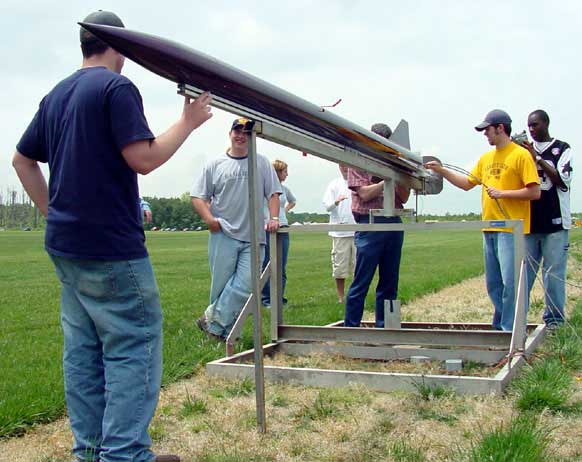Student Teams Take Up NASA Rocket Launch Challenge

More than 500 students from middle schools, high schools and universities across the country will show off their rocketeering skills during a NASA contest in April.
The students, who represent 57 teams from 29 different states, are taking part in NASA's 2011-2012 Student Launch Projects flight challenge. The teams will build large-scale rockets of their own design, then fly them at the space agency's Marshall Space Flight Center in Huntsville, Ala., on April 21.
The 15 middle-school and high-school teams participating will launch their rockets just for fun, in a non-competititve fashion. But the 42 college and university teams will vie for several different prizes, including a first-place purse of $5,000 provided by ATK Aerospace Systems.
The goal of the flight challenge is to engage students more fully in math and science, challenge their problem-solving skills and give them real-world engineering experience, NASA officials said.
"Just as NASA partners with innovative companies such as ATK to pursue the nation's space exploration mission, these young rocketeers pool their talent and ingenuity to solve complex engineering problems and fly sophisticated machines," Tammy Rowan, manager of Marshall's Academic Affairs Office, said in a statement. [Infographic: The World's Tallest Rockets]
Each student team will build a powerful rocket, complete with a working science or engineering payload that must be activated during the launch. The flight goal is to come as close as possible to an altitude of 1 mile (1.6 kilometers), requiring a precise balance of aerodynamics and propulsive power.
The students must also write detailed reports before and after the launch, and they must maintain a public website chronicling their rocket-building adventures. Further, each team is required to develop educational projects for schools and youth organizations in its community, in an attempt to engage and inspire other youngsters, officials said.
In April, the teams will travel to Marshall, where NASA engineers will put the students' rockets through the same type of stringent reviews and inspections they apply to the nation's space launch vehicles. Then, on April 21, students will fire their rockets toward the 1-mile goal, operate their onboard payloads and wait for their craft to return safely to Earth.
Get the Space.com Newsletter
Breaking space news, the latest updates on rocket launches, skywatching events and more!
In addition to the $5,000 grand prize, the college and university teams will compete for a variety of awards for engineering skill and ingenuity, team spirit and vehicle design, officials said.
This year's student participants hail from Alabama, Alaska, California, Colorado, Florida, Georgia, Hawaii, Iowa, Illinois, Indiana, Kansas, Kentucky, Massachusetts, Michigan, Minnesota, Missouri, Mississippi, North Carolina, North Dakota, Nebraska, New Mexico, New York, Pennsylvania, Tennessee, Texas, Utah, Virginia, Washington and Wisconsin.
Follow SPACE.com for the latest in space science and exploration news on Twitter @Spacedotcom and on Facebook.
Join our Space Forums to keep talking space on the latest missions, night sky and more! And if you have a news tip, correction or comment, let us know at: community@space.com.

Space.com is the premier source of space exploration, innovation and astronomy news, chronicling (and celebrating) humanity's ongoing expansion across the final frontier. Originally founded in 1999, Space.com is, and always has been, the passion of writers and editors who are space fans and also trained journalists. Our current news team consists of Editor-in-Chief Tariq Malik; Editor Hanneke Weitering, Senior Space Writer Mike Wall; Senior Writer Meghan Bartels; Senior Writer Chelsea Gohd, Senior Writer Tereza Pultarova and Staff Writer Alexander Cox, focusing on e-commerce. Senior Producer Steve Spaleta oversees our space videos, with Diana Whitcroft as our Social Media Editor.









